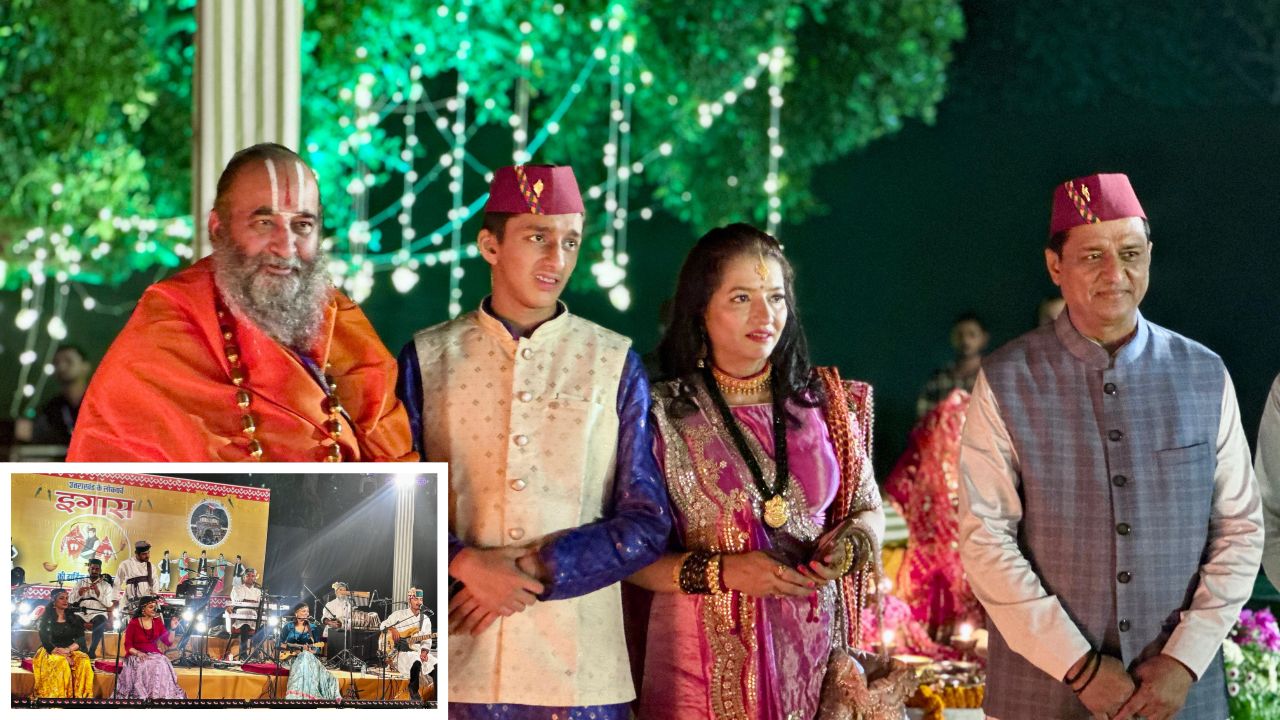Union Home Minister Amit Shah, several Cabinet ministers, and top BJP leaders joined Uttarakhand MP Anil Baluni’s Delhi residence for a grand Igas Bagwal celebration- a night where tradition met political star power.

BJP MP Anil Baluni with wife Deepti Baluni and son at Igas celebration (Credit: Dynamite News)
New Delhi: BJP MP and Media head of ruling party Anil Baluni’s residence in the national capital transformed into a vibrant cultural hub on Friday evening, as senior Union ministers and political leaders gathered to celebrate Igas Bagwal, a traditional festival from the hills of Uttarakhand.
The event brought the warmth of the mountains to Delhi’s political corridors, blending tradition with festive camaraderie.
The celebration turned into a star-studded evening, graced by the presence of Union Home Minister Amit Shah, National Security Advisor Ajit Doval, and several other prominent dignitaries.
Union Minister Amit Shah and NSA Ajit Doval joins the celebration (Credit: Dynamite News)
Baluni, who represents Garhwal constituency in the Lok Sabha, is widely recognised for his efforts to promote Uttarakhand’s culture and folk traditions in the national capital. His annual Igas Bagwal celebration has become an anticipated event that draws leaders from across ministries, reflecting both cultural pride and political goodwill.
During the celebration, Baluni said that Prime Minister Narendra Modi has consistently encouraged people to take pride in their local traditions and showcase them on national platforms. He added that the idea behind hosting Igas Bagwal in Delhi aligns with the Prime Minister’s vision of cultural revival and unity.
“Modiji always says that we must proudly promote our own culture, language, and traditions wherever we are,” Baluni remarked. “This celebration is an effort to bring the essence of Uttarakhand to the national capital and to remind everyone that our diversity is India’s greatest strength.”
BJP MP Baluni highlighted PMi’s call to preserve traditions (Credit: Dynamite News)
He said that by celebrating local festivals like Igas Bagwal in Delhi, people from different regions learn about each other’s customs- strengthening the spirit of Ek Bharat, Shreshtha Bharat.
The evening not only highlighted Uttarakhand’s traditions but also served as a social platform where leaders from diverse portfolios came together in a relaxed atmosphere. Conversations over local delicacies and cultural performances fostered informal camaraderie among policymakers and colleagues.
Baluni expressed gratitude to all those who attended and shared the significance of the festival with them.
“Igas is not just a celebration it’s an emotion that connects every Uttarakhandi to their roots,” Baluni said. “Bringing this tradition to Delhi each year keeps our cultural identity alive while strengthening the bond between the hills and the heart of India.”
Ekadashi in November 2025: Is this the moment for Lord Vishnu’s divine return?
The celebration drew members of the Uttarakhand community living in Delhi-NCR, who viewed it as an important link to their heritage. For many, the event represented the state’s culture finding recognition at the national level.
As folk drums echoed through Baluni’s garden and the scent of Garhwali cuisine filled the air, the Igas Bagwal celebration stood out as more than a festival it was a reminder of how India’s regional traditions continue to thrive and resonate in its political capital.
Celebration of the Budhi Diwali at BJP MP Baluni's residence
Dev Uthani Ekadashi 2025: Date, significance, puja muhurat and rituals explained
Igas Bagwal, also known as Budhi Diwali, holds deep roots in the folklore of Uttarakhand. Celebrated eleven days after Diwali, it marks the time it took for news of Lord Ram’s return to Ayodhya to reach the remote Himalayan hills after his 14-year exile. Villagers then lit lamps and celebrated their delayed Diwali- a tradition that continues to this day.
The festival is marked by lighting oil lamps, folk songs and dances, and community feasts. Cattle are also worshipped as a symbol of prosperity. At Baluni’s Delhi residence, the festivities recreated the same spirit from Garhwali folk performances to authentic Uttarakhandi cuisine, including jhangora ki kheer, chainsoo, and bhatt ki dal.